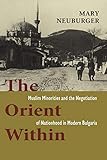The Orient Within : Muslim Minorities and the Negotiation of Nationhood in Modern Bulgaria / Mary C. Neuburger.
Material type: TextPublisher: Ithaca, NY : Cornell University Press, [2011]Copyright date: ©2011Description: 1 online resource (248 p.) : 2 maps, 13 halftonesContent type:
TextPublisher: Ithaca, NY : Cornell University Press, [2011]Copyright date: ©2011Description: 1 online resource (248 p.) : 2 maps, 13 halftonesContent type: - 9780801477201
- 9781501720239
- online - DeGruyter
- Issued also in print.
| Item type | Current library | Call number | URL | Status | Notes | Barcode | |
|---|---|---|---|---|---|---|---|
 eBook
eBook
|
Biblioteca "Angelicum" Pont. Univ. S.Tommaso d'Aquino Nuvola online | online - DeGruyter (Browse shelf(Opens below)) | Online access | Not for loan (Accesso limitato) | Accesso per gli utenti autorizzati / Access for authorized users | (dgr)9781501720239 |
Frontmatter -- Contents -- Illustrations -- Preface -- A Note on Transliteration, Translation, and Sources -- Introduction -- I. The Bulgarian Figure in the Ottoman Carpet: Untangling Nation from Empire -- 2. Muslim Rebirth: Nationalism, Communism, and the Path to I984 -- 3. Under the Fez and the Foreskin: Modernity and the Mapping of Muslim Manhood -- 4. The Citizen behind the Veil: National Imperatives and the Re-dressing of Muslim Women -- 5. A Muslim by Any "Other'' Name: The Power of Naming and Renaming -- 6. On What Grounds the Nation? Parcels of Land and Meaning -- Conclusion -- Selected Bibliography -- Index
restricted access online access with authorization star
http://purl.org/coar/access_right/c_16ec
Bulgaria is a Slavic nation, Orthodox in faith but with a sizable Muslim minority. That minority is divided into various ethnic groups, including the most numerically significant Turks and the so-called Pomaks, Bulgarian-speaking men and women who have converted to Islam. Mary Neuburger explores how Muslim minorities were integral to Bulgaria's struggle to extricate itself from its Ottoman past and develop a national identity, a process complicated by its geographic and historical positioning between evolving and imagined parameters of East and West. The Orient Within examines the Slavic majority's efforts to conceptualize and manage Turkish and Pomak identities and bodies through gendered dress practices, renaming of people and places, and land reclamation projects. Neuburger shows that the relationship between Muslims and the Bulgarian majority has run the gamut from accommodation to forced removal to total assimilation from 1878, when Bulgaria acquired autonomy from the Ottoman Empire, to 1989, when Bulgaria's Communist dictatorship collapsed. Neuburger subjects the concept of Orientalism to an important critique, showing its relevance and complexity in the Bulgarian context, where national identity and modernity were brokered in the shadow of Western Europe, Russia/USSR, and Turkey.
Issued also in print.
Mode of access: Internet via World Wide Web.
In English.
Description based on online resource; title from PDF title page (publisher's Web site, viewed 02. Mrz 2022)


